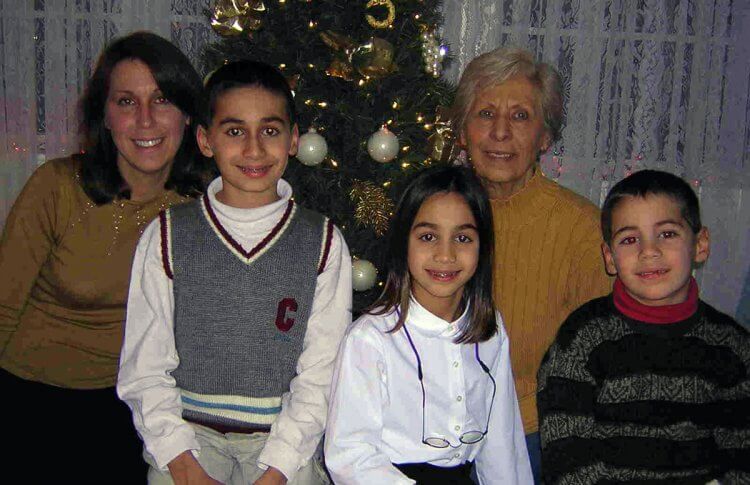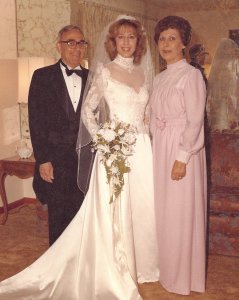Communiqué

One Family’s Journey Through Guardianship Hell
By: Gary Weiss/ Next Avenue
Posted on:
Learning their five mistakes could help you avoid a similar fate

The last time Patricia Femia saw her mother, Ada Vocino, was February 14, 2013 — Valentine’s Day. But this was anything but a heartfelt meeting. The two women were in the Morris County Courthouse in Morristown, N.J. and were there for war.
Patricia was Ada’s only child child. Until a few months before that day in court, Ada’s life had revolved around Patricia and her family. They’d lived together in an apartment Patricia built into her home in 2007, as Ada — a wartime immigrant — wanted. Previously, Ada helped raise Patricia’s sons and daughter.
The two women confronted each other in the Superior Court of the State of New Jersey because Patricia had petitioned to become Ada’s guardian, believing her mother was incapable of managing her affairs. They would’ve become among the estimated 1.5 million active guardianship cases in America.
When Guardianship Goes Awry
Sadly, guardianship often goes awry. It did for Patricia and Ada.
Patricia says her mother’s last words to her, spoken in that courtroom: ‘My lawyers promised me that they would destroy your family.’
Patricia wanted to be appointed Ada’s guardian because she’d been growing increasingly anxious about signs of her mother’s decline, including apparent dementia and numerous auto accidents. In 2011, Ada failed a written test and lost her license. In February 2012, when Ada was taken to Chilton Medical Center due to dizziness and fainting, she threatened to kill herself and her family and was then committed to Ramapo Ridge Psychiatric Hospital for observation. She was returned to Chilton and later voluntarily readmitted to Ramapo Ridge. While there, a doctor diagnosed her as suffering from bipolar disorder and “senile dementia of the Alzheimer’s type.”
Patricia was especially worried about Ada’s depression and suicide threats. Once, Patricia found an ice pick in Ada’s room. Her mother also kept a rope under her bed and had threatened to hang herself. Her bouts of paranoia terrified Patricia. On top of that, Ada resisted medical care for serious cardiac and respiratory issues.
But Patricia recalls “frequent temper tantrums and constant mistrust” eroding their relationship. They were the reason Ada refused to relinquish control over her affairs to Patricia and deeply resented the guardianship proceeding.
Her Mother’s Last Words to Her
Patricia says her mother’s last words to her, spoken in that courtroom: “My lawyers promised me that they would destroy your family.”
In a decision handed down from the bench the next day, Patricia lost the case in every possible way. Judge Donald Coburn not only denied her guardianship petition, he slapped Patricia with a $675,000 judgment, payable to her mom, to unravel years of intermingled finances and jointly owned assets. An appeal of the judgment was dropped as part of a settlement. Patricia wound up owing about $310,000 in legal bills.
Ada died, alone and despondent several years later, on October 29, 2016, at 92, weighing only 70 pounds.
Since the trial they hadn’t been in touch; Patricia says her letters went unanswered, her phone messages weren’t delivered and her visitation attempts were rebuffed. She learned about her mom’s death in a call from the funeral home.
Cleaning out her mom’s room after her passing, Patricia didn’t find a single photo of Ada with her family, just pictures of her mother with the people who evidently had come to mean most to her at the end of her life: her lawyers and their families.
‘My Mother Was Stolen Away From My Family’

Patricia sums up what happened this way: “My mother was stolen away from my family.” Even Patricia’s husband, Bob, — though not a party to the case — lost his job after a mangled version of the legal warfare hit the web. “We hit rock bottom at that point,” he recalls.
The question isn’t whether the judge made a right or wrong decision, but what can the rest of us learn from this family’s nightmare, which could have happened anywhere.
What advance planning can prevent the kind of torment Patricia and Ada experienced? What do you do when a strong-willed parent insists on managing her own affairs even when signs of dementia begin to surface? How do you prevent disputes over money and health care from escalating into a family-severing nuclear war? If advance planning hasn’t been done and mistakes have been made, how do you prevent family relationships from disintegrating?
The agony inflicted on both sides of this family saga could have been thwarted by rudimentary advance planning, according to experts in elder law. Yet many people fail to prepare adequately for family care and estate issues and then are forced to endure the consequences.
A Landmark Guardianship Case for the Pain It Caused
Even five years after the legal battle ended, the Ada Vocino case is still considered something of a landmark among guardianship professionals — not for establishing any great legal precedents, but for the pain it caused.
“You sit there and shake your head how things can go that bad that fast,” says Frederick Paugh, a field investigator with the New Jersey Long Term Care Ombudsman who examined some of the financial aspects of the case at the request of Ada’s assisted living facility. “But you know what? It happens.”
What ended as a descent into legal hell began in Italy as a love story.
When Ada Miniussi was 20 in 1944, she was staying in Rome with an aunt. She met a staff sergeant with Army Air Force, an Italian-American from New Jersey named Lawrence Vocino. They were wed in Italy in September 1945 and settled in Clifton, N.J. He worked for the Veterans Administration for 42 years. She started out as a seamstress, and then became a stay-at-home mom after Patricia was born. When Lawrence died in 1988, Ada was 64 and on her own for the first time since Italy.
Patricia was then 28 and lived about a half hour away. She filled in for her dad by handling her mom’s finances, paying her bills and helping her find doctors. To keep her mom active, Patricia set Ada up in a little seamstress business doing alterations from home, helping her with marketing and pricing. Patricia worked full-time and was starting a family, so her mom helped with child care, something she loved.
Then, things started to get messy.
Home, Not Sweet, Home

Their relationship was so close that in 1994, Ada decided to move near Patricia in Kinnelon. Patricia found a lot near the Femia residence and made sure a house was built to Ada’s specifications. Patricia financed the purchase of the land and construction of the home (which cost $207,300) with a home equity loan on the Femia house. The house was initially bought in the name of Patricia and her husband; it was subsequently deeded to Ada.
Shortly before completion of the home, Ada put up for sale her condo in Clifton. At that time, as one of Patricia’s lawyers said in a brief filed years later, “a verbal agreement existed between Patricia and [Ada] that upon completion of the [Kinnelon] property and sale of [Ada’s] condominium, [Ada] would reimburse Patricia and Robert for the purchase and construction.” The condo sold for $199,000. Ada’s new home was then transferred to Ada, who wrote checks to Patricia totaling $190,000.
Ada lived in the home until 2007 and then sold it. Patricia says her mom promised to use the proceeds to reimburse the Femias for the cost of constructing her apartment in the “mother/daughter” home the Femias built.
As Patricia puts it, “We had verbal familial agreements and commitments, which had been in place for decades because there was complete trust between us.”
The 5 Financial Mistakes This Family Made
That’s commonplace among families, but also a recipe for disaster if the arrangements become subjected to court scrutiny.
Mistake No. 1 for the family: an oral real estate agreement.
“One of the first things a law student learns in Property 101 is that oral contracts are void,” says Sally Hurme, an elder law attorney who has served on the board of the National Guardianship Association.
Whatever you do that involves real estate, experts say, put it in writing. It doesn’t have to be anything formal or legalistic, just a letter from mom to adult child, or vice versa, signed and dated by both.
Mistake No. 2 for the family: Parents and adult children should have their own legal advisers for financial transactions, but that didn’t happen here.
There’s a basic reason for this — fairness. Also, if the transactions come under legal scrutiny, legal representation of all parties will help everything pass the smell test.
Joseph K. Jones, whose firm Jones, Wolf & Kapas provides estate planning in New York and New Jersey, points out that legal advice to both parties, each with a lawyer, reduces any potential future concerns that the elderly parent was pressured into doing anything — what’s known as “undue influence.”
Mistake No. 3 for the family: joint ownership of real estate between mother and daughter.
When Ada’s house sold, the $470,000 proceeds were deposited into a bank account owned jointly by Ada and Patricia with right of survivorship. If one co-owner died, the other would get the money.
Lawyers take a dim view of joint accounts held by parents and their adult children. It’s a “really really dangerous maneuver,” says Jones.
For one reason, no matter how innocent the motive in establishing a joint account, it will be viewed with skepticism if the finances are called into question, as they were here. Ronald A. Fatoullah, a New York elder law attorney who is co-chairman of the Alzheimer’s Association Long Island Chapter, says such arrangements are common, but “in many of these cases there’s a little bit of undue influence.” (That wasn’t alleged in the Vocino case.)
Also, a joint account can be jeopardized by poor financial decisions of either party, and the money is vulnerable to potentially malicious actions of the other joint owner. If a parent or child grows alienated from the other, either can empty out the account.
Even if there is no undue influence, a judge may someday decide that in a case like the Femias, the account belongs to the parent. Jones, who was asked to review the judge’s ruling and other legal papers in the Femia case, says that in such situations, “what the law looks at, and what the judge did correctly, is he looked at who contributed the money.” Judge Coburn’s ruling was blunt. Addressing Patricia, he said: “The money is not yours. It’s hers.”
Mistake No. 4 for the family: no power of attorney or medical proxy.
In Spring, 2012, Patricia was looking for an assisted living facility for Ada and decided on Paragon Village in Hackettstown, N.J. While filling out the paperwork, it became apparent that Patricia had two problems: she had no power of attorney to allow her to act on her mom’s behalf, nor a medical proxy that would have given her the authority to make medical decisions for Ada. By then, it seemed too late to ask Ada to sign such legal papers since she had been diagnosed as suffering from dementia.
Patricia felt she had one alternative route to take care of her mother: guardianship proceedings. A petition for guardianship was filed on April 13, 2012, the day Ada was released from Ramapo Ridge and admitted into Paragon.
The guardianship proceedings turned into an ugly battle. Ada retained a local lawyer, Robert A. Scirocco, who was later joined by a court-appointed lawyer, Richard P. Diegnan Jr. (Neither Scirocco, Diegnan, Patricia’s appellate law firm nor her lawyer at the trial, Adrienne J. Burke, responded to requests for interviews for this article.)
Patricia’s attorney had the burden of proof to show that Ada lacked “capacity” to handle her own affairs. If a person is found to lack capacity, he or she is declared “incompetent.” The potential for hurt feelings is obvious.
Patricia testified about her mother’s declining mental state. Two psychiatrists were called by Patricia’s lawyer and testified that Ada did not have capacity and needed a guardian. But the judge was openly skeptical of the testimony of one of the doctors and subjected him to harsh questioning. He did believe the testimony of witnesses called by Ada’s lawyers, who said Ada didn’t need a guardian.
The testimony of a psychiatrist at Ramapo, called by Patricia’s lawyer, was also damaging to Patricia’s case. Although he had diagnosed Ada as suffering from dementia, he testified that he didn’t believe she needed a guardian to handle her affairs.
But perhaps the most persuasive witness for the judge was Ada herself.
In a pretrial deposition before the trial, Ada had been composed, articulate and clearly antagonistic to her daughter. The judge called Ada “a lovely woman, proud, and clear minded about what she likes and what she doesn’t like.” The judge accepted Ada’s explanation for her suicide threats: she didn’t mean to kill herself or harm others. He concluded that while she was “a little histrionic at times as she fought for control of her own life,” she was not a danger to herself or others.
Ada’s lawyer filed a counterclaim, contending that Patricia had engaged in “conversion” — improper use of funds that belonged to Ada. The judge agreed.
Although the judge had some kind words about Patricia, he noted, “Ada wants her independence. And we have a Constitution in this state and this country and it says, you know, unless there’s a reason, you’re free even to be foolish. And there is no reason here.”
Mistake No. 5 for the family: Patricia’s bringing the guardianship case.
The videotaped deposition showed that Ada held considerable animus against Patricia, and that she’d do everything she could to undermine her daughter’s case. Seething with rage, her eyes narrowing with anger, she said: “My daughter wanted me to be declared insane and be my custodian so she can take care of me and do whatever she wants with me.” Ada went on to deny every aspect of her daughter’s case, from her own behavior to their intermingled finances.
Also, though there was a diagnosis of dementia, that didn’t make guardianship a slam dunk. “Just because somebody is in the early stages of that disease doesn’t mean that they don’t have capacity,” says Fatoullah.
Kezeli Wold, associate commissioner for Adult Protective Services at the Texas Department of Children and Family Services, says “one of the complexities of the whole concept of capacity or competency is that it’s on a scale. A person can experience early dementia and experience some memory loss and maybe some mild confusion during certain times of the day. But that doesn’t necessarily mean that they aren’t able to comprehend the situation they’re in, the decisions that they’re making and the choices that they’re making.”
The weakness of one of Patricia’s experts, the doctor cross-examined by the judge, didn’t help her, either.
Guardianship: A Last Resort
The bottom line that a guardianship proceeding is a nuclear weapon, only to be used as a last resort. And it can blow up in the face of the person seeking it.
“Guardianship is not something to be entered into lightly by any stretch of the imagination,” says Stephanie Hunsinger, AARP’s New Jersey state director.
The end of the guardianship case didn’t end the family’s legal skirmishing. Patricia filed an appeal but later dropped it, instead settling with Ada in August 2013. Under the terms of the settlement, Patricia funded an escrow account for $525,000, from which Ada was to withdraw $10,000 a month. At the time of her death, the remaining money was to go to Patricia’s three children.
But the cost of the case can be measured in more than just dollars. The family was, in essence, shattered.
In April 2013, after the trial, a small-town newspaper ran an article with the fallacious headline, “Kinnelon Couple Faked Alzheimer’s and Stole $980k From Elderly Mother .” In reality, there was no finding of theft and the judge didn’t say Patricia made a false claim of Alzheimer’s. The article also mistakenly said the trial “involved” Patricia’s husband Robert, and gratuitously mentioned his employer.
The article, distributed statewide on NJ.com, was later retracted and taken off the web, but by then, the damage had been done. Bob Femia was fired by his employer, Glatt Air Techniques, the local affiliate of a multinational company. His former employer’s attorney wrote that Bob was fired “based upon the potential damage to [the company’s] reputation” as a result of the publicity generated by the litigation. Says Femia: “You really have no idea how far south things can go with these types of situations.”
Although the false article came out of left field, the family animosity was predictable and is hard to prevent in such situations.
Family Relationships Destroyed
“Guardianship can go very well, in certain circumstances. But I have seen family relationships destroyed as a result of guardianship proceedings,” says E. Elizabeth Loewy, formerly chief of the Elder Abuse Unit of the Manhattan District Attorney’s Office and co-founder of the EverSafe financial monitoring service.
That’s precisely what happened with Patricia Femia and her mom.
Ada’s relationship with her daughter pretty much evaporated after the guardianship case commenced, and Ada’s lawyers then became a kind of substitute family, angering the Femias.
Ada’s last months were spent depressed, seriously ill from multiple ailments and alone. Her “support network,” Diegnan reported at the time, consisted of her lawyers and their staffs and families. Patricia says she tried to visit her mother at Paragon a few times after the trial, and was told “that she was getting a test done or participating in an activity or they rang her phone in her room and no one answered or they would say that she did not want to see any of us (grandkids included).”
An Attempt to Appoint a Temporary Guardian
In July 2016, three months before Ada died from congestive heart failure, Diegnan applied to the court for appointment of a temporary guardian. Two psychiatrists found her to have dementia, one describing it as advanced and accompanied by “progressive neuro cognitive decline.” Another lawyer appointed by the court interviewed Ada and found her to be alert and following the news. But she couldn’t remember the name of one of her grandchildren.
Ada was asked by her new lawyer if she wanted to take care of her own finances. Possibly, she said. But “she really didn’t want to have to do it, because she didn’t care. . . . she really didn’t care what happened to her.”
Moral of the Story
The moral of this story? “It’s hard to repair relationships when things have gone so far as to go to court,” says Camille Payne, director of field operations of the Texas Department of Family and Protective Services.
She suggests that adult children in such situations maintain communications as best as possible; explain that the legal proceedings were brought with the best of intentions and try to get friends or relatives to play peacemaker.
If the adult child feels that the guardianship proceeding was a mistake, an admission of error may help. But, Payne says, “if the elderly parent has mental illness, there may be nothing that you can do to repair whatever their mind thinks you have done to them.”
There were no winners in the “Matter of Ada Vocino, an Alleged Incapacitated Person,” as it is officially called in New Jersey court records. Ada may have come out on top, but what she lost — her family — could not be replaced by her lawyers or the money they were able to get for her.

By Gary Weiss

